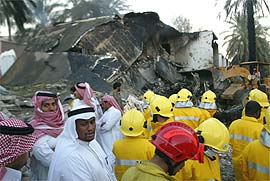A bloodied kingdom
( 2003-11-11 09:57) (Economist.com)
The latest terrorist attacks in Saudi Arabia have left at least 17 people dead, most of them Arabs from neighbouring countries. The perpetrators seem intent on bringing down the kingdom.
In U.S. President George Bush's view, Iraq is the "central front" of the war on terror. But Iraq's giant neighbour, Saudi Arabia, cannot be far behind. On Sunday November 9th, suicide bombers apparently disguised as Saudi policemen struck a diplomatic housing compound in Riyadh, the capital, killing at least 17 people. Almost all the dead were from neighbouring Muslim countries, including Lebanon, Syria and Egypt.
 Al-Qaeda has already been fingered as the likeliest suspect. Richard Armitage, America's deputy secretary of state, who is visiting Riyadh, said he believes Osama bin Laden's terror group was behind the attacks. Saudi diplomats agree. The weekend attack is certainly reminiscent of suicide bombings against an expatriate housing complex six months ago in Riyadh, which killed 35 people. Those attacks were also blamed on al-Qaeda. Al-Qaeda has already been fingered as the likeliest suspect. Richard Armitage, America's deputy secretary of state, who is visiting Riyadh, said he believes Osama bin Laden's terror group was behind the attacks. Saudi diplomats agree. The weekend attack is certainly reminiscent of suicide bombings against an expatriate housing complex six months ago in Riyadh, which killed 35 people. Those attacks were also blamed on al-Qaeda.
Why would Mr bin Laden's lot be targeting fellow Muslims from neighbouring countries? Some have speculated that the bombers believed more Americans lived in the complex, but this seems weak: al-Qaeda usually chooses its targets with care. More likely is that the attacks are part of an effort to topple the Saudi government, as Mr Armitage also said.
Mr bin Laden, himself an exiled Saudi, has often railed against the government's cosy relationship with America—and specifically the presence of American troops on Saudi soil. The American bases in Saudi Arabia, which once housed nearly 5,000 troops, closed down after this spring's Iraq war (the bases had been mostly used to patrol the no-fly zone over Iraq, which became irrelevant after Saddam Hussein was ousted). But this apparently failed to mollify al-Qaeda. The terror group would like nothing better than to sow chaos in a country that neighbours Iraq and serves as America’s biggest supplier of crude oil. On this view, killing visiting Arabs, including children (and during the Muslim holy month of Ramadan) could show the impotence of the Saudi regime. It could just as well backfire, by rousing sentiment against al-Qaeda in places like Egypt and the Palestinian territories, whose people have in the past shown some sympathy with the terror group's anti-American objectives—not to mention in Saudi Arabia itself.
Ironically, al-Qaeda and America appear to share the same near-term goal: to force change on the ruling Saudi princes. But they favour entirely different outcomes, of course. Last week, Mr Bush, in a sweeping speech, laid out a vision for democracy taking root in Arab countries. Unlike Syria and Iran (which have long been on Washington’s blacklist), Saudi Arabia was not explicitly criticised. But Mr Bush implicitly rebuked the kingdom, whose repressive political life is dominated by its 5,000 princes. America would also like to see the influence of Wahhabism, the strict Islamic strain propagated by the ruling family, diminished.
Already some reforms are occurring, albeit slowly. Crown Prince Abdullah, the de facto ruler, recently agreed to televise meetings of the country's national assembly and to hold local elections in 2004. The country's open battle against terrorism is itself a change. Even after the September 11th attacks on America—in which most of the 19 hijackers were Saudi nationals—the kingdom was loath to admit that it had a terrorism problem. Some officials initially disputed that Saudis were involved in September 11th, and blamed foreigners for bombings in Saudi Arabia in 2000 and 2001. But the suicide attacks six months ago in Riyadh horrified ordinary Saudis and forced the regime to face up to the presence of home-grown terrorism. Since then, Saudi police have devoted a good deal of energy to rooting out militants; there have been several bloody shoot-outs in Riyadh. Arab countries whose citizens were killed in Sunday’s bombings, and America too, would like to see still more progress.
|

